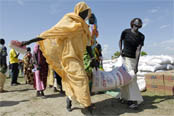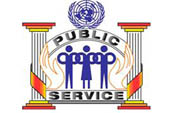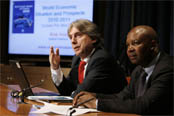
Empowering women to participate fully in economic life across all sectors and throughout all levels of economic activity is essential to build strong economies and establish more stable and just societies. It also propels countries to achieve their internationally agreed goals for development, sustainability and human rights as well as improve the quality of life for women, men, families and communities.
The 2010 Annual Ministerial Review (AMR) will try to assess the progress made towards achieving some of these goals which are part of the Millennium Development Goals (MDGs) and other goals and targets agreed at major UN conferences and summits over the past 15 years, which together constitute the United Nations Development Agenda (UNDA).
The AMR will be held during the High-Level Segment of the substantive session of ECOSOC from 28 June to 1 July 2010 at the United Nations Headquarters in New York. The central focus of the review will be on “Implementing the internationally agreed goals and commitments in regard to gender equality and the empowerment of women”. It is expected that the AMR could also contribute to the Beijing+15 global review, assessing the progress made in the Beijing Platform for Action, adopted in 1995.
The AMR session consists of three main elements: A global review of the United Nations development agenda, a thematic review, and a series of national voluntary presentations of both developing and developed countries on their progress in implementing internationally agreed development goals, including the Millennium Development Goals (MDGs).
The current global and national trends and challenges and their impact on gender equality and empowerment of women are going to be at the forefront of the session. The major trends and challenges that have affected economic and social conditions worldwide, especially in developing countries include imbalances and systemic weaknesses in the global economy, food insecurity, climate change, humanitarian crises, armed conflicts, and international development cooperation.
Women in conflict, post-conflict and post-crises situations
Women tend to suffer disproportionately in time of crisis or hardship, as evidenced during the recent financial and economic crisis and food crisis, as well as from the impacts of climate change. Also, women frequently have fewer and less effective economic and social safety nets. Periods of transition and crisis provide, however, an opportunity to redefine economic and social policies and related institutions, to advance gender equality and empowerment of women.
Evidence shows that women and girls tend to suffer significantly more during times of conflict and unrest. The use of sexual and gender-based violence as a deliberate tactic of warfare has increased alarmingly in recent years. One trend, which have been observed in some conflicts, is increasingly organized and widespread sexual violence, including rape, sex trafficking, forced marriages, and other human rights abuses.
In times of crisis, all forms of gender-based violence, in particular sexual violence tend to exacerbate and access to health care, education and livelihood can also be severely affected. In addition, for women and girls, the occurrence of sexual violence often continues well after “peace” has been established.
One way to mitigate and address the situation is involving women in decision-making process in conflict, post-conflict and post-crises situations. In many crisis situations, women continue to be excluded from decision-making processes and recent evidence point to an inadequate recognition of and financing for their needs.
Conflicts, natural disasters and other crisis situations have profoundly different impacts on women, girls, boys and men, who also bring different perspectives and solutions to the issue at hand. The participation and inclusion of women in the aftermath of a crisis is not only effective but can also prove to be essential. For overlooking the needs and priorities of women and girls, including in terms of physical security, access to basic services and control of productive assets and income, can have devastating consequences.
However, crises may provide important opportunities for positive transformation of gender roles and women’s political, economic and social empowerment. In post-crisis situations, it is important to build on and expand these opportunities and redress gender inequalities and gender-based discrimination of the past, including through legislative change, policy development, institutional and economic reforms and allocation of resources.
Ensuring women’s participation
Today there is an increased recognition of the importance of gender equality and empowerment of women to effective crisis response, as well as to sustainable economic growth and development.
The United Nations Security Council urges Member States, UN bodies, donors and civil society to ensure that women’s empowerment is taken into account during post-conflict needs assessments and planning, and factored into subsequent funding disbursements and programme activities, including through developing transparent analysis and tracking of funds allocated for addressing women’s needs in the post-conflict phase.
The AMR also calls for women’s increased participation in peace processes, the elimination of sexual violence in armed conflict, the protection and promotion of women’s human rights and mainstreaming of gender equality perspectives in the context of armed conflict, peacekeeping, peacebuilding and reconstruction. There are good and promising practices which need to be implemented effectively in post-conflict and crisis situations.
For more information: http://www.un.org/en/ecosoc/newfunct/amr2010.shtml


